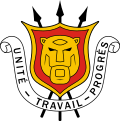 | |
Yugoslavia | Burundi |
|---|---|
Burundi and the former Socialist Federal Republic of Yugoslavia were both members of the Non-Aligned Movement and they developed their relations in the framework of the Cold War Third World cooperation.
Yugoslavia recognized the independence of the Kingdom of Burundi in 1962. [1] Yugoslavia was one of the first countries in the world to recognize the independence of Burundi. [2] Formal diplomatic relations between the two countries were established already in 1962. [3] Two countries signed the Agreement on Technical Cooperation on 21 January 1971 which enabled an exchange of experts and scientists between Yugoslavia and Burundi and enabled trade in convertible currencies. [4] Yugoslavia maintained an embassy in Bujumbura. [5] [6]
In the last decade of the 20th-century, both countries experienced ethnic violence which escalated in Burundian Civil War and Yugoslav Wars. [7] Ethnic violence and war in Yugoslavia, combined with the collapse of the central federal institutions led to the breakup of the country.


